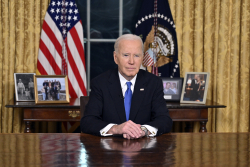Trump is clearly distancing himself from Netanyahu—and moving the United States away from Israel’s preferred maximalist policies toward Iran and the Middle East as a whole.
“During the bad times, I learned who was loyal and who wasn’t. I believe in an eye for an eye. A couple of people who betrayed me need my help now, and I am screwing them against the wall!”
Donald Trump wrote those words in his third book, The Art of the Comeback. And while the book was written in 1997, long before Trump’s political career began, the president has never forgotten the lessons contained within.
Many of Trump’s adherents suggest that America is now living through the Art of the Deal, the name of Trump’s first bestseller. That was the first term. Today, we’re living through the Art of the Comeback.
Nor is this a feel-good story, as its name might suggest. Instead, the Art of the Comeback is the ultimate revenge story. It is Trump’s answer to the New York elites, with whom he had once cavorted but who had abandoned him in the wake of his messy divorce from his first wife, Ivana, and the subsequent massive bankruptcy that nearly ended his real estate empire.
Still, as luck would have it—and Trump was the luckiest of them all, it would seem—Trump did make a comeback. It was iconic.
Trump’s second term marks another comeback. Now that Trump has returned, he is taking retribution out on those whom he believed abandoned him in his darkest hour. And just as with his first comeback in the 1990s, Trump is again today going after his former friends.
And one such former friend is Benjamin Netanyahu, the longtime Prime Minister of Israel.
Why Trump and Netanyahu Broke Up
It all started with the strike on Iranian Revolutionary Guards Corps (IRGC) Quds Force commander Qassem Soleimani.
Soleimani had been tracked by U.S. intelligence since the earliest days of the Global War on Terrorism. He was, after all, one of the world’s preeminent terrorists, overseeing Iran’s proxy militant groups from Iraq to Yemen. American officials described him as the “General Patton of terrorism.” Despite being a constant target, a succession of U.S. presidents, from George W. Bush through Barack Obama, had avoided killing him for political reasons.
The Israelis had no such compunctions. They wanted Soleimani dead. According to Donald Trump, the Israeli and American intelligence services had coordinated closely for months in the run-up to the assassination of Soleimani. It had all the appearances of a true partnership.
And then, as a clearly wounded Trump recounts the tale, the night before the joint U.S.-Israel strike was set to occur, Netanyahu phoned Trump and pulled out of the operation. Angered, but not wanting to let that villain live, Trump followed through with the operation. And Soleimani’s assassination was a coup for the United States; it threw Iran’s Middle East policy into total disarray, irreversibly weakening the “Axis of Resistance.”
That Soleimani strike benefited Israel far more than it did the Americans—but by avoiding involvement, Israel guaranteed it would not become a major target for Tehran’s inevitable retaliation. In other words, Netanyahu pulled a fast one on Donald Trump, a man who is pure id. Trump has never forgiven Netanyahu. To this day, he regularly brings up that incident in his list of grievances whenever he can at his raucous public rallies.
Then came the ultimate kicker for Trump. In the early hours after the 2020 presidential election, as Trump fumed at the reported results and vowed to challenge them, Netanyahu made a congratulatory phone call to Joe Biden, becoming one of the first world leaders to do so. Trump even later claimed that Netanyahu was the first leader to congratulate Biden—helping to seal perceptions of his victory at a critical juncture.
Of course, Netanyahu was not the first, or even among the first, world leaders to send a congratulatory message to Biden. Canada, Britain, and the European Union each issued congratulatory messages days before. But that was to be expected. On the other hand, the notion of Netanyahu not standing by Trump—after all that Trump had done for Netanyahu and for Israel, and in his moment of maximum political need—stuck in Trump’s mind these last five years as an unforgivable betrayal.
Indeed, in a contentious interview shortly after he had left the White House in 2021 under a cloud of ignominy, Trump gave an exclusive interview to Israeli reporter Barak Ravid, in which Trump hurled endless vituperations at the reporter when Netanyahu’s name was brought up.
“Bibi could have stayed quiet. He has made a terrible mistake,” Trump said ominously. He punctuated the point further, saying, “I haven’t spoken [to Netanyahu] since. F— him!”
There is no question that Trump is animated by the Art of the Comeback as much as by The Art of the Deal. One instinct feeds the other. And Netanyahu is at the nexus of those two animating sources of Donald Trump’s psyche right now.
After the Ravid piece was published, Trump would go another two years without having anything to do with Benjamin Netanyahu. This only changed after GOP megadonor Miriam Adelson and a handful of other prominent Jewish-American political insiders worked to repair the ruptured relationship between Trump and Netanyahu. It seemed to have worked—with the United States only being weeks away from launching a massive air war against Iran’s suspected nuclear sites.
At least, that was the case until the renewed Trump-Netanyahu relationship stopped working for Trump.
After all, both Trump and Netanyahu are very transactional world leaders. It is clear that neither Netanyahu nor Trump really like each other—and they have no real loyalty to one another, only shared interests. Those interests diverge at some point, and we are reaching that point of divergence today.
The Gaza War Is the Only Thing Keeping Netanyahu Alive
During the October 7, 2023, terrorist attacks by Iran-backed Hamas against Israel, the Netanyahu government was caught with its proverbial britches down. There is ample evidence to suggest that there were many indicators and warnings that the Netanyahu government and Israeli Defense Forces (IDF) leadership ignored. Had they paid closer heed to those indicators and warnings, Israel might have prevented those horrific attacks.
Since that time, however, Netanyahu has skirted much of the blame—which should be placed on his shoulders for that obvious intelligence failure.
Netanyahu knows a thing or two about the “art of the comeback” himself. He clawed his way back from the political afterlife, having been subjected to a bevy of investigations and facing backlash for his attempt to reshuffle both the government and Israeli Supreme Court more to his liking. He survived it all. What’s more, the moment the 10/7 attacks occurred, Netanyahu got a political reprieve. The national dialogue in Israel turned away from his alleged misdeeds—and toward rallying under his leadership to crush Hamas.
Recognizing that the war was key to his political survival, Netanyahu did all he could to prolong it. He even opened new fronts each time it looked as though the Israeli people and their elected officials were readying to finally start asking him some tough questions for the security failures that had occurred under his watch.
As a result, over the last three years, Israel’s mission in Gaza has gone from what should have been a limited counterterrorism and hostage rescue effort to what appears to be a quasi-religious crusade to expand Israel by force, driving out the Palestinians once and for all—and possibly sparking a regional war with Iran in the process.
Trump Won’t Save Netanyahu from His Own Errors
None of this, however, changes the problems under the surface. Netanyahu’s investigations have not been closed down; they are lying dormant until the end of the war. Once that war ends, it appears inevitable that Netanyahu will fall from power—and possibly into prison.
Both Netanyahu and Trump know that the only way the current prime minister can be saved from this fate is if Trump uses the U.S. military to bail Netanyahu out by going to war with Iran. If Netanyahu can get Trump to knock out Iran’s suspected nuclear enrichment sites and perhaps trigger a regime collapse in Iran, then Netanyahu can claim that was because of him, and leverage that success to get out of jail—or at least very serious inquiries into his conduct.
And that’s to say nothing of the fact that Netanyahu knows his multi-front war is in no way winnable without immediate, massive American military intervention against the true adversary of this fight: Iran.
But Trump despises the appearance that he is being used.
Recent revelations about the extent and inappropriate nature of Trump’s (now former) White House National Security Adviser Mike Waltz’s relationship with senior Israeli national security leaders makes it seem as though Trump was being manipulated into a war he did not really want against Iran.
Not only has Trump removed Waltz, but he is also clearly distancing himself from Netanyahu and moving the United States away from Israel’s preferred maximalist policies toward Iran and the Middle East as a whole.
In the last two weeks, the forty-seventh president agreed to a ceasefire with the Iranian-backed Houthi rebels of Yemen, indicated real willingness to negotiate a new nuclear deal with Tehran, and apparently pulled the B-2 Spirit long-range stealth bombers out of the naval base at Diego Garcia—from where it was expected they would launch a massive bombing campaign against Iran, with Israeli support. The U.S. president even told Saudi Arabia’s government that he was open to dropping the precondition that Riyadh recognizes Israel before being permitted to develop a civilian nuclear energy program.
Whether Trump can successfully deal with the Iranian regime is another matter. But so long as Benjamin Netanyahu remains in office in Israel, with Trump as president of the United States, the U.S.-Israeli alliance is going to be on ice for a while until Netanyahu and his government can make themselves appear more useful to the mercurial American president.
Or until Netanyahu is no longer in power.
As with all great historical tragedies, the confluence of personal discord among leaders, disagreements in strategy, and political ideology are all congealing into one situation wherein the U.S. is distancing itself from the Israelis and may very well help to establish a new regional order that diminishes Israel’s role. All because Trump and Netanyahu dislike each other.
More importantly, because Netanyahu underestimated and misunderstood his American interlocutor. Today, his country will pay the price for as long as he remains the prime minister.
About the Author: Brandon J. Weichert
Brandon J. Weichert, a Senior National Security Editor at The National Interest as well as a contributor at Popular Mechanics, who consults regularly with various government institutions and private organizations on geopolitical issues. Weichert’s writings have appeared in multiple publications, including the Washington Times, National Review, The American Spectator, MSN, the Asia Times, and countless others. His books include Winning Space: How America Remains a Superpower, Biohacked: China’s Race to Control Life, and The Shadow War: Iran’s Quest for Supremacy. His newest book, A Disaster of Our Own Making: How the West Lost Ukraine is available for purchase wherever books are sold. He can be followed via Twitter @WeTheBrandon.
Image: Shutterstock / noamgalai.
















